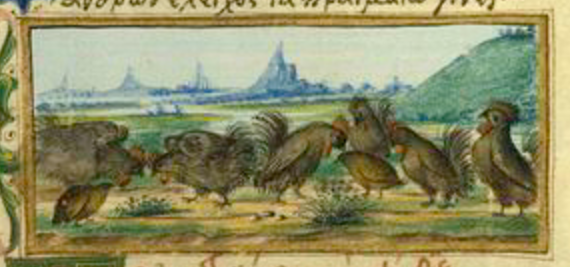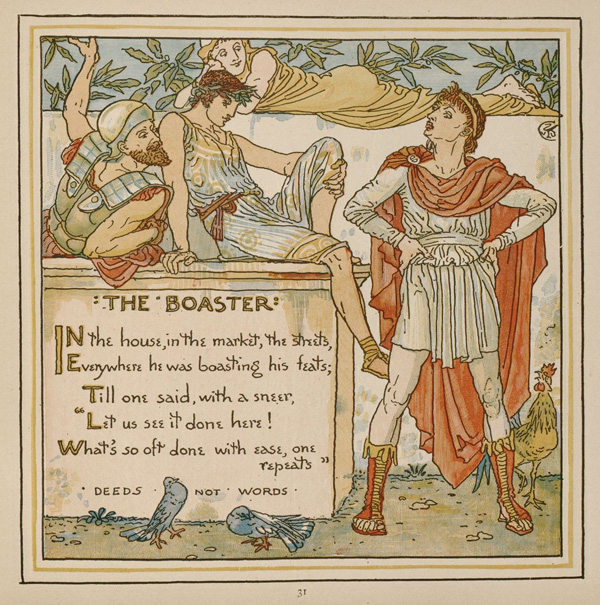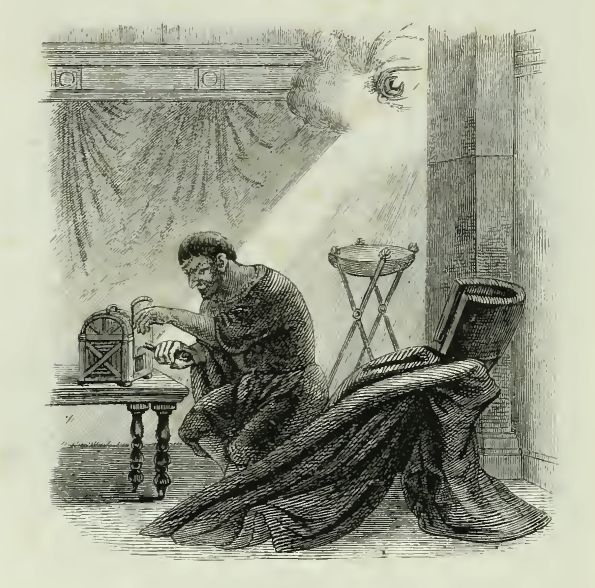166. Of a Fox and a He-Goat
A fox and a goat being thirsty descended into a certain well, in which, when they had well drank, the fox says to the goat, looking about for a return, "Goat, be of good cheer, for I have thought by what means we both may be brought back. If truly thou wilt raise up thyself straight they forefeet being set to the wall, and wilt lean forward thy horns, thy chin being drawn to thy breast, I leaping over thy back and horns, and escaping out of the well, will bring thee thence afterwards. In whose counsel the goat having faith and obeying, as she commanded, she leaped out of the well, and then jumped for joy upon the bring of the well, and rejoiced, having no care of the goat. But when she was accused by the goat as a league-breaker, she answered, "Indeed, goat, if there had been to thee as much of sense in thy mind as there i of hairs on thy chin, thou wouldst not have descended into the well before that thou hadst examined about a return."
Moral. This fable hints that a prudent man ought to examine the end before that he comes to perform a thing.

167. Of the Cocks and a Partridge
When a certain man had cocks at home, he bought a partridge, and gave her into the company of the cocks to be fed, and fattened together with them. The cocks every one for himself bit and drove her away. But the partridge was afflicted with herself, thinking that such things were offered to her by the cocks, because her kind was different from their kind. But when not long afterwards she saw them fighting amongst themselves and mutually striking, recovered from grief and sadness, she said, "Truly after these things I shall not be afflicted more, seeing them fighting even amonst themselves."
Moral. This fable hints that prudent men ought to bear the contumelies offered by foreigners, whom they see not to abstain from the injury of their own countrymen.

illustration from the Medici Aesop
168. Of a Boaster
A certain man having traveled a long while, when he was returned home again, when boasting told many other things done by him manfully in diverse regions, and truly that especially, that at Rhodes, he had excelled all in leaping, that the Rhodians who had been present, were witnesses of the same thing: one of those, who were present, answering him said, "O man, if that is true, which you speak, what need is there to you of witnesses? Behold a Rhodian! Behold here a trial of leaping!"
Moral. This fable shows that where true testimonies are present there is no need of words.

169. Of a Man Tempting Apollo
A certain wicked man betook himself to Delphos about to tempt Apollo, and having a little sparrow under his cloak which he held in his first, and going to the trevet, he asked him, saying, "What I have in my right hand: is it living or is it dead?" About th epluck forth the sparrow alive, if he had answered dead; again about the pluck it forth dead, if he had answered, alive, for he would have killed it presently under the cloak privily before that he plucked it out. But the God, understanding the deceitful craftiness of the man, said, "O consulter, do thou which of the two thou art more willing to do, for it is in the power of thee, and pluck out either alive or dead what thou hast in thy hands.
Moral. This fable hints that nothing lies hid from nor deceives the divine mind.

170. Of the Fisherman and the Sprat
A certain fisherman, hsi nets being let down into the sea, brought out a small sprat, which thus besought the fisherman, "Be not willing to take me so little at present; suffer me to go away and to grow, that afterwards thou mayest obtain me thus gorwn up with greater advantage." To whom the fisherman said, "But I should be mad if I should omit a gain, although small, which I have between my hands for the hope of a future good, although great."
Moral. This fable shows him to be foolish who, for hope of a greater advantage, does not embrace a thing both present and certain, although small.

No comments:
Post a Comment
Comments are limited to Google accounts. You can also email me at laurakgibbs@gmail.com or find me at Twitter, @OnlineCrsLady.